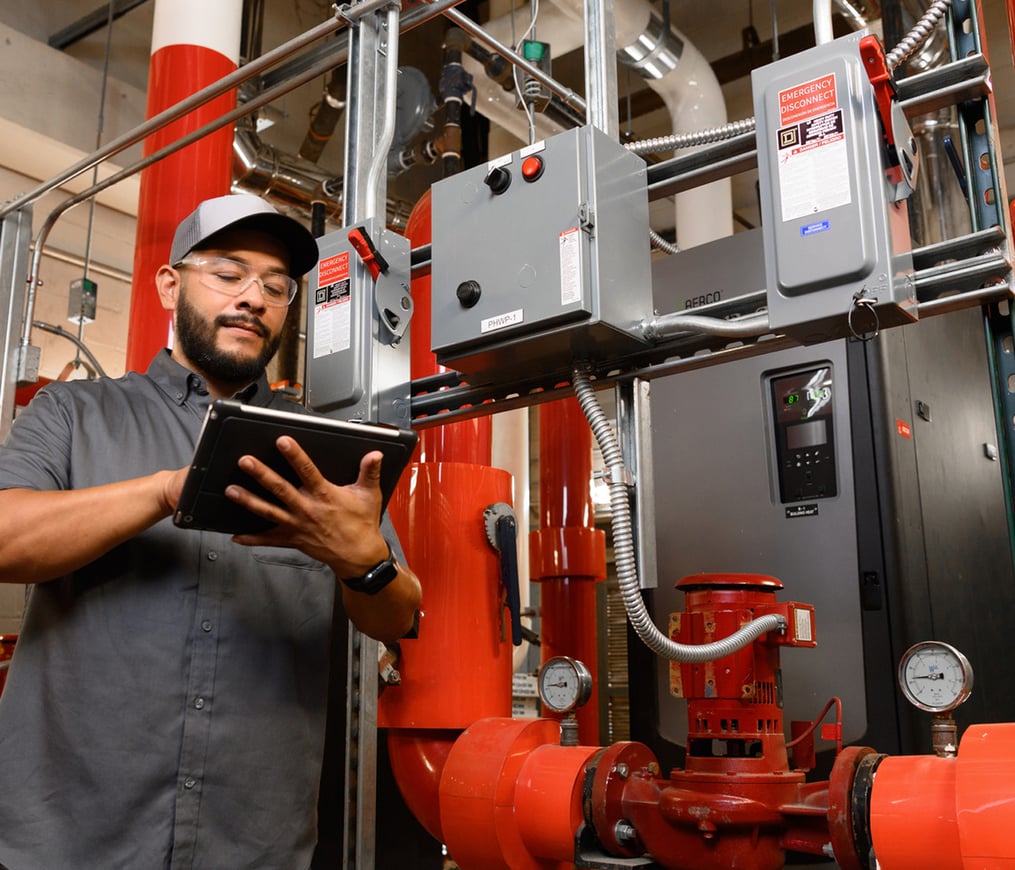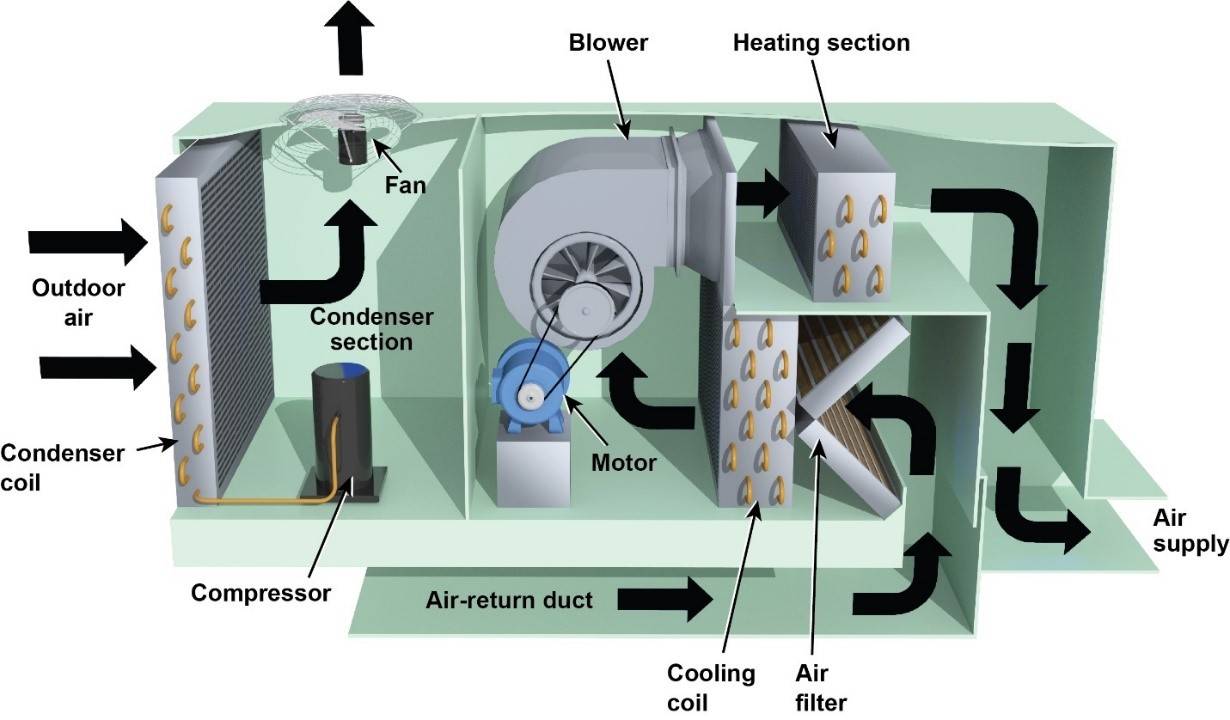Commercial HVAC Installation Services for Large-Scale Cooling Systems
Commercial HVAC Installation Services for Large-Scale Cooling Systems
Blog Article
An In-Depth Take A Look At Heating And Cooling Solutions and Their Effect On Power Effectiveness and Expense Cost Savings
With technological improvements like wise thermostats and high-efficiency components, the potential for enhancing system performance is huge. As we explore the elaborate relationship in between A/c systems and operational expenses, consisting of the shift in the direction of eco friendly choices, the concern emerges: how can these strategies be effectively executed to make best use of both financial and eco-friendly advantages?

Relevance of HVAC Systems
cooling and heating systems are an important element of contemporary structures, playing an important role in preserving healthy and balanced and comfortable indoor atmospheres. These systems, encompassing air, air flow, and heating conditioning, are important for regulating temperature, moisture, and air quality, thus guaranteeing the wellness of residents. Effective heating and cooling systems add substantially to creating an optimum interior climate, which is essential for both domestic and commercial spaces.
In business structures, cooling and heating systems are important to offering a risk-free and efficient setting. By managing interior climate problems, these systems aid protect against the growth of mold and the spread of air-borne impurities, thus protecting the health of customers and workers. Additionally, in residential setups, heating and cooling systems enhance living problems by providing regular thermal comfort and improving interior air high quality, which is essential for total wellness.
Furthermore, the style and upkeep of heating and cooling systems have a direct effect on power consumption and operational costs. Effectively designed and preserved systems can significantly decrease power usage, resulting in lowered utility costs and a smaller sized carbon footprint. The effectiveness of these systems thus plays an essential role in promoting sustainability and power preservation within structures, highlighting their importance in the modern-day architectural landscape.
Developments in HVAC Innovation
Advancement in HVAC technology is transforming the means buildings manage indoor climates, ushering in a brand-new period of performance and control. Recent improvements have concentrated on enhancing power intake while boosting customer convenience. One remarkable development is the assimilation of clever thermostats, which utilize expert system to learn occupancy patterns and adjust temperature levels accordingly, reducing unneeded energy use.
Variable Refrigerant Flow (VRF) systems stand for an additional substantial jump onward. These systems permit exact temperature level control in various zones of a structure, enhancing comfort and reducing power waste. VRF modern technology is particularly useful for large business areas, using versatility and scalability.
Additionally, the arrival of Net of Points (IoT) gadgets has changed HVAC systems right into interconnected networks with the ability of real-time information collection and evaluation. This connection allows predictive upkeep, guaranteeing systems operate at peak performance and reducing unexpected downtime.
In addition, developments in products and design, such as the use of high-efficiency coils and compressors, have actually improved general system performance - Heating Contractor. The adoption of ecologically pleasant cooling agents also underscores the market's commitment to sustainability
These technical developments are crucial in minimizing operational prices and environmental influence, establishing brand-new requirements for constructing environment management.
A/c Upkeep and Efficiency
Guaranteeing optimum efficiency of heating and cooling systems expands beyond technological developments; it additionally depends upon efficient maintenance techniques. Regular maintenance is crucial for maintaining effectiveness, lowering energy consumption, and prolonging the life expectancy of a/c systems. The key goal is to make certain that all parts function at their peak potential, thus decreasing power wastage and maintaining constant interior convenience degrees.
Regular maintenance tasks, such as cleaning or replacing air filters, examining cooling agent degrees, and inspecting ductwork for leaks, are crucial for avoiding unnecessary stress on the system. Clogged or dirty filters can block air movement, causing the system to work harder and consume even more power. Similarly, poor cooling agent degrees can lower cooling down effectiveness, causing greater operational costs.
Additionally, routine inspections by certified experts can recognize prospective problems before they escalate right into pricey fixings or system failings. These assessments usually consist of inspecting electrical links, calibrating thermostats, and ensuring the total stability of the cooling and heating system. By attending to small issues early, businesses and home owners special info can prevent unexpected breakdowns and boost power performance.
Economical Heating And Cooling Solutions
For those wanting to obtain the most out of their ventilation, air, and heating conditioning systems without damaging the bank, discovering cost-efficient cooling and heating options can make a considerable distinction. One instant measure is to buy programmable thermostats, which permit customers to set specific temperature levels for various times of the day, optimizing power use and decreasing unneeded intake. By automating temperature level modifications, homeowners can attain considerable savings on energy expenses.
Routine upkeep is another important component of cost-effective heating and cooling management. Making sure that filters are cleansed or changed frequently, ductwork is sealed, and systems are serviced by experts can avoid expensive repair services additional hints and improve system long life. Precautionary upkeep not just preserves system performance yet additionally helps in avoiding unexpected malfunctions that can cause pricey emergency situation fixings.
Additionally, retrofitting existing systems with energy-efficient components, such as variable speed electric motors or high-efficiency compressors, can be a sensible financial investment. These upgrades boost functional performance, decrease energy use, and can often be implemented at a fraction of the cost of a complete system substitute.
Environmental Influence Decrease
Minimizing the ecological impact of heating and cooling systems is vital in today's pursuit of lasting living. Cooling and heating systems are substantial factors to energy consumption, making up almost 40% of energy usage in industrial buildings. This energy need frequently depends on nonrenewable fuel sources, resulting in greenhouse gas discharges and ecological destruction. Transitioning to extra effective systems, such as those utilizing renewable resource resources, can considerably mitigate these impacts.
Technological advancements in HVAC design and operation, including the assimilation of clever thermostats and energy-efficient heatpump, are crucial in lowering carbon footprints. These technologies permit for maximized power usage, lessening waste and boosting total system efficiency. Furthermore, taking on regular upkeep methods ensures heating and cooling systems run at peak performance, additional reducing unnecessary power intake.
Moreover, the use of eco-friendly cooling agents is critical, as conventional cooling agents, like CFCs and HCFCs, have actually been phased out because of their ozone-depleting properties. Modern choices, such as hydrofluoroolefins (HFOs), deal decreased environmental risks, lining up with global environmental protocols. By accepting these sustainable methods, HVAC services can play a transformative function in decreasing ecological influences, promoting energy performance, and promoting a much more sustainable future.
Verdict

Furthermore, the layout and maintenance of Cooling and heating systems have a direct effect on power intake and functional expenses. Regular maintenance air duct repair is crucial for maintaining efficiency, minimizing power usage, and prolonging the life span of A/c systems. Heating and cooling systems are substantial factors to energy intake, accounting for almost 40% of energy use in industrial buildings. In addition, adopting regular upkeep techniques makes certain Heating and cooling systems operate at peak performance, more stopping unneeded power consumption.
The change to ecologically pleasant A/c systems even more lowers operational prices and advertises sustainability. (Heating Contractor)
Report this page